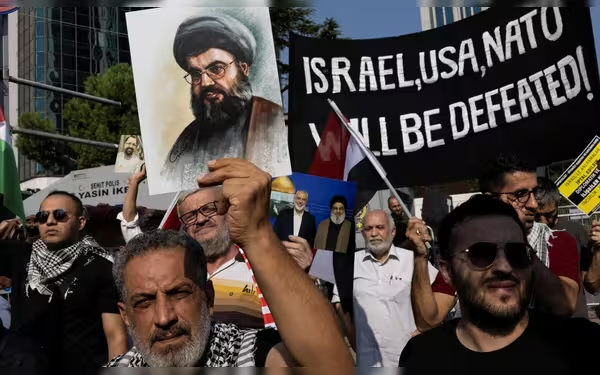Sunday, October 6, 2024 12:37 AM
US Troop Deployment Amid Escalating Israel-Hezbollah Conflict
- US increases military readiness for potential troop deployment.
- Iran vows retaliation against Israeli military actions.
- Humanitarian crisis in Lebanon worsens with thousands displaced.
 Image Credits: dawn
Image Credits: dawnThe US prepares for troop deployment as Israel intensifies attacks on Hezbollah, escalating tensions and worsening the humanitarian crisis in Lebanon.
In recent days, the Middle East has been engulfed in turmoil as Israel escalates its military operations against Hezbollah in Lebanon. This situation has intensified following the assassination of Hezbollah leader Sayyed Hassan Nasrallah, which has drawn sharp reactions from various global leaders and sparked fears of a broader conflict in the region. The United States has responded by increasing its military readiness, indicating a potential deployment of troops to the area, while also enhancing its air support capabilities.
Israel's military actions have claimed the lives of several high-ranking Hezbollah officials, including Ali Karake, a key commander in southern Lebanon, and Iranian Revolutionary Guards commander Gen Abbas Nilforoushan. In retaliation, Iran has vowed to respond to what it calls a "horrible crime of the aggressor Zionist regime." Iranian President Masoud Pezeshkian has stated that Israel should not be allowed to attack countries aligned with Iran without facing consequences.
The situation has prompted a flurry of diplomatic efforts, with Western leaders attempting to de-escalate tensions. French Foreign Minister Jean-Noel Barrot is set to visit Beirut, while Russian Prime Minister Mikhail Mishustin is scheduled to meet with the Iranian president. The United Nations Security Council has also been called to address Israel's actions, highlighting the international concern over the escalating violence.
In the United States, officials have expressed a desire for a peaceful resolution to the conflict. White House National Security Spokesperson John Kirby emphasized that an all-out war with Hezbollah or Iran would not benefit the residents of northern Israel. He stated, "If you want to get those folks back home safely and sustainably, we believe that a diplomatic path is the right course." This reflects a cautious approach from the Biden administration, which has reiterated its support for Israel's security while also advocating for the protection of civilians.
As the violence continues, protests have erupted across the Middle East and beyond, with demonstrations occurring in countries such as Syria, Cyprus, and Pakistan. The killing of Nasrallah has resonated deeply, even prompting Lebanon’s top Christian cleric, Maronite Patriarch Bechara Boutros Al-Rai, to acknowledge the profound impact of this event on the Lebanese people.
In the midst of this chaos, the humanitarian situation in Lebanon is dire. The ongoing bombardment has resulted in over 1,000 deaths and left more than 6,000 people injured within just a week. The Lebanese government reports that approximately one million people, which constitutes a fifth of the population, have been displaced from their homes. Many families are now seeking refuge in makeshift accommodations, struggling to find basic necessities.
Pope Francis has also weighed in on the situation, condemning the Israeli military actions as "beyond morality" and calling for an immediate ceasefire. His remarks highlight the moral complexities of warfare and the need for a balanced approach to conflict resolution.
In response to the crisis, the Ministry of Foreign Affairs in Pakistan has activated its Crisis Management Unit to assist Pakistani nationals affected by the situation in Lebanon. This underscores the global ramifications of the conflict and the need for countries to support their citizens in times of crisis.
As the situation unfolds, it is crucial for the international community to engage in meaningful dialogue and seek a resolution that prioritizes peace and stability in the region. The ongoing violence not only affects those directly involved but also has far-reaching implications for global security and humanitarian efforts. The hope remains that through diplomacy and cooperation, a path towards lasting peace can be forged, allowing the people of the Middle East to rebuild their lives free from the shadow of conflict.













